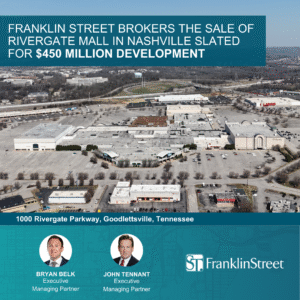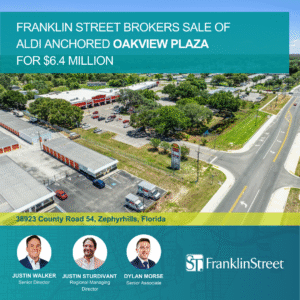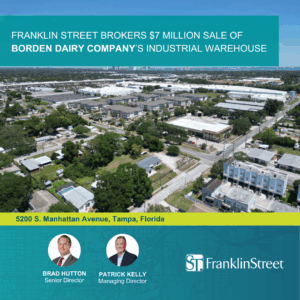Florida’s economic boom, population growth and low unemployment rates continues to draw new retail and restaurant concepts into the market. However, commercial retailers are having to battle fast-rising construction costs and high rents across the state. Meanwhile, the grocery real estate scene is also seeing dramatic changes. Franklin Street’s Whitney Butler, director of retail leasing, shares her insights into how those factors are impacting Jacksonville and Northeast Florida.
When you reflect on the past year in the Jacksonville retail market, is there one trend or hot-button issue that stands out?
Retail is not dead! If you look at the number of online retailers and food trucks that are now adding physical brick-and-mortar locations to grow their business, the outlook remains positive. Some strong retailer examples are Warby Parker, UNTUCKit (who recently opened their first Jacksonville location), Fabletics and others.
Urban areas that are walkable and have growing hubs of restaurants, services and businesses are highly sought after as well. Health, fitness and wellness are now key categories to fill retail space and large anchor boxes as they become available.
What are the biggest challenges in the Florida retail market today?
Rising costs and rent levels. Rental rates are at an all-time high. In retail, there is a direct correlation in the sales a retailer can generate from a location and the rents they can pay. With less supply available and high retail space demand in the market, owners can push rental rates. Those factors, coupled with the high and increasing cost of construction, makes it difficult to find locations and economics that work for both owners and retailers.
Although not necessarily a challenge, the continued growth and change of the grocery sector – primarily the specialty grocers like Whole Foods, GreenWise, Lucky’s, Trader Joe’s, and Sprouts – is a trend that everyone is watching.
What makes the Jacksonville real estate market unique in comparison to other markets?
Jacksonville’s continued rise and recognition as a city that is sought-after by millennials and companies from all over is due in large part because we offer what both groups seek from a new city – a well-recognized art community, and a growing and thriving culinary scene with unique offerings and renowned chefs. This, of course, is in addition to our low cost of living, high-quality lifestyle, strong business climate and fantastic weather. Retailers, restaurants and entertainment concepts are seeking out Jacksonville and, if they are not already here, they are definitely looking to come into the market.
What are some retailers that are actively expanding in Jacksonville?
In Jacksonville, we are seeing large growth in the pet sector, especially pet care, coupled with a social component for animal lovers. Dogtopia has their second store expected to open soon and DogTown USA is active locally, along with a few other similar concepts new to the market.
TopGolf will continue to be a good one to watch as they get creative and find a way to use technology to offer an experience that translates into a more traditional retail and/or mall environment. This strategy will provide a path of growth that is not confined to large tracts of land and a footprint that is hard to place in more urban and infill areas.
WeWork is defining how the co-working model can be successful, and even provide an answer for shopping center owners in driving foot traffic and bringing millennials back to the malls, where they are converting former department stores to WeWork locations.
Retail has been the source of media scrutiny in recent years, but is today’s retail landscape actually any riskier than it was a decade ago?
Retail is and always will be everchanging. We are really in no different of a state than when the dot com world began, and shopping centers were assumed to become “not as relevant.”
The online world has empowered the consumer with knowledge and possibilities of new experiences. So, the retailers that are changing with the consumer and always evolving to remain relevant are succeeding in today’s market. Old school retailers that have not incorporated experience (higher-quality customer service, omni-channels, and a social presence that engages customers) are the ones not thriving. Ulta is a great example of a traditional retailer that is growing and expanding in part due to their superior in-store experience.
About Franklin Street: Celebrating more than 10 years in the business, Franklin Street is a family of full-service commercial real estate companies focused on delivering value-add solutions to meet the evolving needs of clients. Through a collaborative philosophy of leveraging the resources, expertise and experience of each of its divisions – Real Estate, Capital, Insurance, Property Management and Project Management – Franklin Street offers unmatched value and optimal solutions for clients nationwide. Learn more about Franklin Street at FranklinSt.com.



